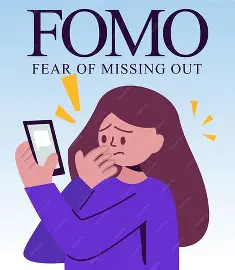One of the earliest memories I have of digital media was when I got my first smartphone. I was around eleven years old and a lot of children in my class already had smartphones. I remember being particularly excited to have a phone because it meant I would have Whatsapp. Some classmates of mine had made a class-group chat and I could finally join it now that I had a smartphone.
Before getting a phone I had felt left out. I still saw my classmates every school day and hung out with my friends after school. However, I still felt like I was missing out by not being in that groupchat. Once I joined, that feeling of missing out stayed. Even though I had a phone and I could be a part of all the groupchats I could imagine, I still found myself having FOMO (fear of missing out).

This fear of missing out started becoming noticeable once I started having social media. I could see so many people posting about their lifes. Everybody did something different and they all looked very happy. Obviously I knew social media could be very fake, but I still felt like I was missing out on these “great” experiences. To make myself feel like I wasn’t missing out, I would look at more and more content. However this never really filled that void of missing out and loneliness and only caused anxiety.
An international research was done about this exact topic by Kristiania University of Applied Sciences in Norway and the University of Ss. Cyril and Methodius in Slovakia. 450 students all over Slovakia participated in various test and the results seem te be nuanced. Female students were more likely to feel FOMO and loneliness after excessive use of social media than male students. And the advice given after this research was to instill more support for students in universities.
This advice seems valid to me, however I do think that the issue at hand is a very personal matter. It is clear that being on social media for an extensive amount of time is not good for ones mental health. It can cause even more FOMO, when the intention is to combat it. But the only way to stop the cycle is to cut down screen time and start living in the real world and I am not sure if a university could help in this matter.
Yes, a university could help you implement more offline time in your schedule. However, it is really up to you to actually follow this new schedule and to have the discipline to do so. With any person who struggles with mental health the only way for them to get better is if they want it themselves. Once someone makes that decision, they can actually start healing. And another important part of this process is time. The more mature someone gets the less FOMO they will experience.
To conclude, FOMO is something you might experience online and offline. You might fall into a cycle of feeding into that FOMO. But do not fear, if you want you can get out of it. 🙂


Recent Comments